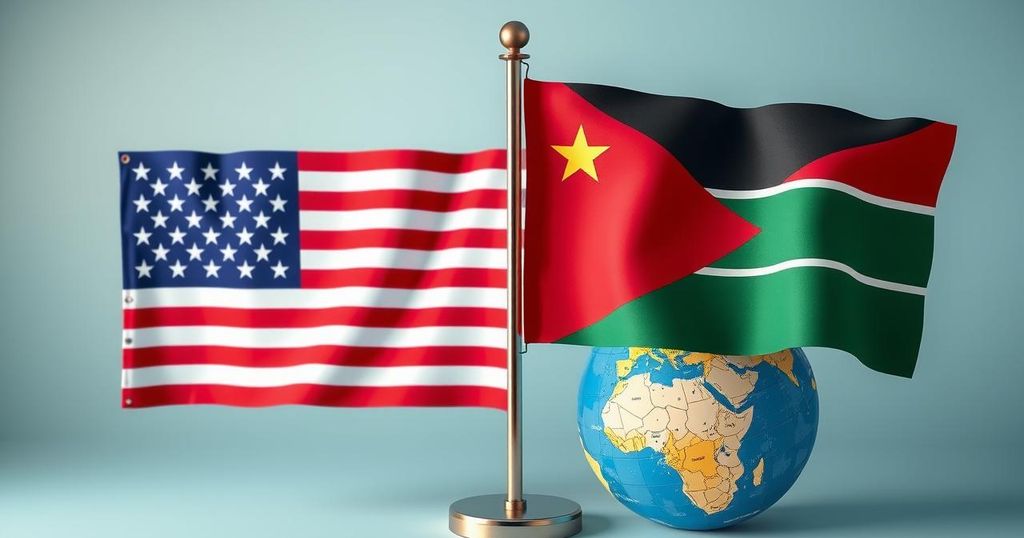Global news
AB, ABIOL LUAL DENG, ACADEMY OF MEDIA ARTS, AFRICA, ASIA, CANADA, CIVIL WAR, COLOGNE, CONFLICT RESOLUTION, DENG, DEPARTMENT OF STATE, DIPLOMACY, DW, EUROPE, GERMANY, HUMANITARIAN ISSUES, INTERNATIONAL RELATIONS, JU, JUBA, KHALED MAHMOUD, MARCO RUBIO, MEXICO, NORTH AMERICA, PHILIPPINES, RI, RIEK MACHAR, RUB, RUBIO, SAL, SALVA KIIR, SOUTH SUDAN, SOUTH SUDANESE, SUDAN, UNITED STATES, UNITED STATES DEPARTMENT OF STATE, US, WASHINGTON
Fatima Khan
0 Comments
Escalating US-South Sudan Tensions Amid Visa Controversy
The US and South Sudan are experiencing heightened diplomatic tensions over a visa issue following Juba’s refusal to accept a deported individual, with Secretary of State Marco Rubio accusing South Sudan of ignoring repatriation obligations. The US has revoked visas for all South Sudanese nationals, raising concerns for those under Temporary Protected Status, as well as students and athletes in the US.
The diplomatic rift between the United States and South Sudan has intensified following Juba’s refusal to accept an individual deported from the US whom they claimed was a Congolese citizen misusing South Sudanese documents. In response, US Secretary of State Marco Rubio criticized South Sudan for not adhering to their obligation to repatriate its citizens, stating that “Every country must accept the return of its citizens in a timely manner.” Consequently, the US Department of State announced the revocation of all visas held by South Sudanese passport holders effective immediately.
The ongoing political turmoil in South Sudan has put pressure on its transitional government, formed by President Salva Kiir and Vice President Riek Machar in 2020. This has led to escalating violence between government forces and opposition groups. The US’s decision to revoke visas raises concerns, particularly for South Sudanese individuals who have been granted Temporary Protected Status (TPS), shielding them from deportation due to the country’s instability.
Khaled Mahmoud, an Egyptian writer, expressed dismay on X (formerly Twitter), asserting that this action signifies a departure from the humanitarian principles that have historically characterized the United States’ foreign policy. International relations analyst Abiol Lual Deng also pointed out that targeting a nation like South Sudan over a singular incident appears unjust and could signify a broader trend of US pressure on smaller nations, even among its allies.
In response to the US actions, South Sudanese officials labeled the decision as unjust, asserting their cooperation in other deportation matters. After further review, authorities confirmed the deportee’s actual nationality as Congolese, leading to a decision to accept him back into the country on humanitarian grounds. Despite this concession, it remains uncertain whether the US will reconsider its visa restrictions on South Sudanese nationals.
The ramifications of the US visa ban may extend beyond diplomatic relations, potentially affecting over 100 South Sudanese individuals under the TPS program, as well as athletes and students in the US. Two Democratic representatives from North Carolina are urging Secretary Rubio to reverse the visa order, emphasizing the valuable contributions and the non-involvement of South Sudanese individuals in the dispute between the US government and South Sudan’s transitional leadership.
In conclusion, the worsening diplomatic confrontation between the United States and South Sudan over visa issues underscores significant humanitarian concerns. The US’s decision to revoke visas for South Sudanese nationals has raised alarms regarding the impact on individuals already facing precarious situations due to the ongoing conflict in their homeland. Calls for reconsideration from community representatives reflect the urgent need for a more compassionate and pragmatic approach in the application of US immigration policy towards South Sudanese citizens living in the US.
Original Source: www.dw.com




Post Comment